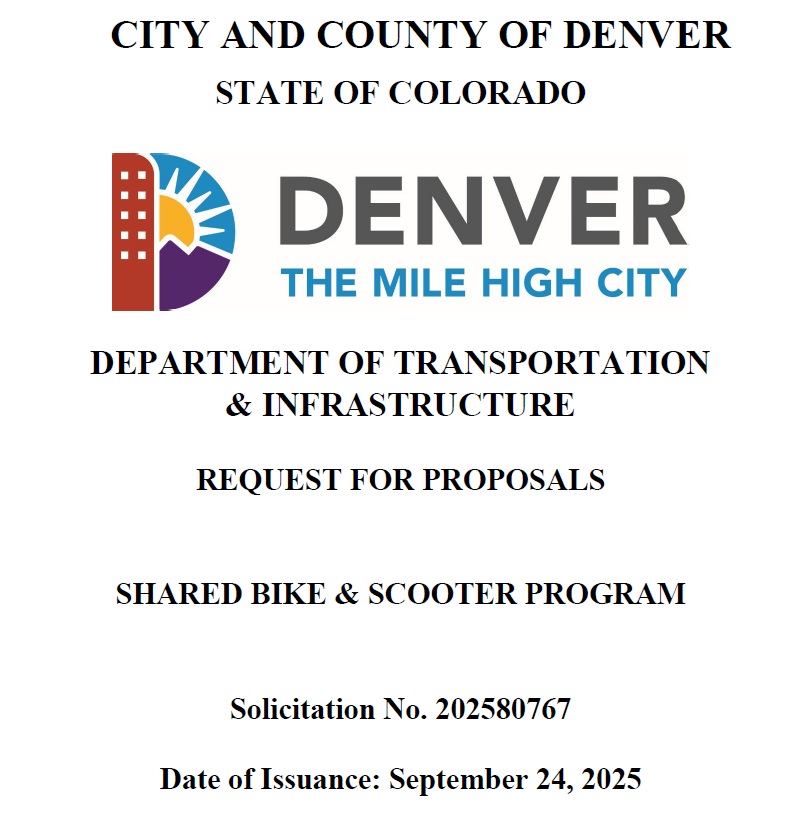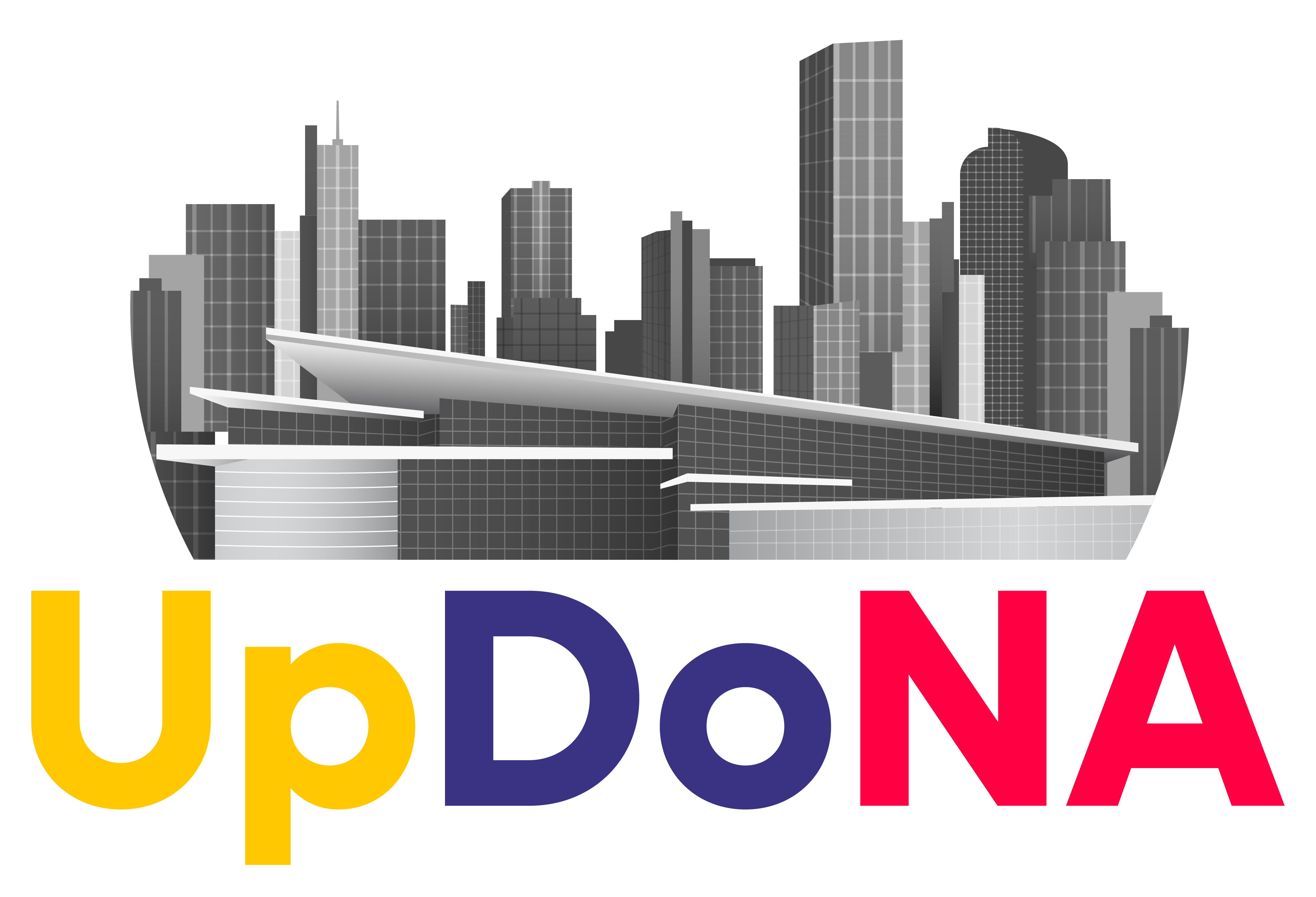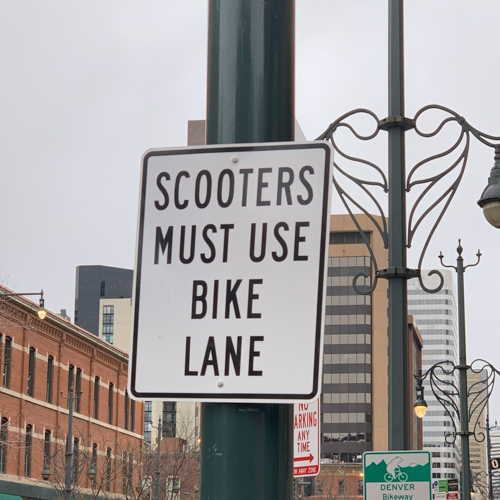
So much has happened since our last Update – too much, in fact, to include here. Look for lots of additional information in our January 2026 Update.
IN THIS ISSUE OF THE SCOOTER SUBCOMMITTEE UPDATE:
- A Major Milestone: the Request for Proposals
- Timetable for Proposals + Approvals
- The Five Program Priorities
- RFP Tidbits
- Next Steps
- Our Next Meeting
A MAJOR MILESTONE: THE REQUEST FOR PROPOSALS. On September 24, 2025, Denver officially issued its new Request for Proposals for the next generation of the City’s Shared Bike & Scooter Program. What makes this so significant? Well, we’ve been operating under the standards initially imposed by Denver some 5 years ago, as a response to scooter vendors unceremoniously dumping scooters on Downtown Denver’s sidewalks. We’ve had a lot of regrets and learned a lot of lessons since those standards were developed. But, because the companies’ contracts with the City provided for a 5-year initial term, there was not much leverage to get companies to make changes to their programs. All of that is now changing.
As you’ll recall, Councilmember Chris Hinds led a successful effort earlier this year to impose certain standards on the scooter companies by way of a new municipal ordinance. It requires, among other things, solutions to the two most-reviled problems: scooters parked nilly-willy, blocking pedestrian (and wheelchair) passage AND scooters being operated on our downtown sidewalks. The new ordinance goes into effect in Summer 2026, timed so that it’s effective when the new contracts with scooter companies take effect. You can think of the new municipal ordinance as the bare-minimum that scooter companies must provide, while the new upcoming contracts will be more exhaustive. What’s the first big step towards getting new contract(s) with scooter companies? It’s called a Request for Proposals. Let’s look at the timing.
TIMETABLE FOR PROPOSALS + APPROVALS.
- September 24, 2025 The City sends its request for proposals
- October 29, 2025 Deadline for scooter company responses
- November 19, 2025 City issues its list of the top contenders
- December 8-11, 2025 Interviews + demonstrations of vendors’ devices
Followed by an announcement of the company (or companies) who have won the bid
Then, actual contract negotiations begin and one or two scooter companies will launch under the new 2026 standards in the summer. That’s a moment that literally has been years in the making. In recent years, UpDoNA has been meeting with City officials and representatives of the scooter companies to explain our concerns with the current program and to propose new solutions. We are excited to see that many of our proposals have been incorporated into the City’s Request for Proposals, setting new standards for the scooter companies. So, let’s dig in.
THE FIVE PROGRAM PRIORITIES
Denver’s Request for Proposals breaks out its top 5 priorities for a contract with a scooter vendor. When companies deliver their proposals to the City, they’ll be evaluated on how well the proposal would satisfy these City goals:
- Safety & “Vision Zero”
- Equity & Access
- Parking & The Public Realm
- Mode Shift & Transit
- Sustainability & Resiliency
You may recognize some of those buzz words from other contexts, but here’s what the City is looking for:
Safety & “Vision Zero” – supporting the City’s “Vision Zero” program to reduce roadway deaths by using scooter/bike-safety design + technologies AND provide the City with reports showing which geographical areas have proven to be problematic.
Equity & Access – basically, scooter deployments and free rides for those who qualify for traditional subsidies; this is already a feature of the existing shared scooter/bike program.
Parking & Public Realm – installing more parking corrals for scooters/bikes to reduce sidewalk clutter and improve ADA access AND “reducing” sidewalk riding.
Mode Shift & Transit – shifting drivers away from automobiles and onto share scooters/bikes
Sustainability & Resiliency – minimizing the environmental impact of shared scooters/bikes
Each of the first three categories will be weighted with 30 points, while the last two categories will be weighted with 20, and 10, respectively.
RFP TIDBITS. The City’s Request for Proposals is a dense document that’s long on details, so here are some that caught our attention:
- The City will enter into a contract with only one or two of the winning proposals
- The initial fleet size will be 9,000 devices or fewer
- Only half of the fleet may be the traditional stand-up scooters; the other half will be made up of shared bikes and shared sit-down scooters
- The scooter company must remove broken scooters or those illegally-parked within 2 hours of a report
Vehicles must have a unique vehicle identification number on a plaque in a font size 100pt
(perhaps so that it’s easier to identify and punish violators(?)
- Depending on the day/time and the vehicle location, the rider may be required to take a cognitive test before beginning a trip, in order to reduce drunk driving
- Companies must “distribute” helmets to at least 5% of the fleet (insert here the likelihood of riders donning helmets 😉
- New riders must pass a Denver-approved Safety Quiz prior to taking their first trip
- There must be a “free rides” program for people that qualify for programs like SNAP, Medicaid, etc. (Expect the scope of this program to be the subject of contract negotiations)
- “Equitable Access” to the shared scooter/bike program includes requirements like implementing a cash-based system for those without credit cards, offering access to those who do not use a smartphone and to those who do not speak English
- At least 5% of a company’s total Denver fleet must offer assistance to those who need adaptive devices (ADA), for example: sit-down scooters, three-wheeled scooters, and vehicles with hand-controls
- There will be “slow zones,” “no-ride zones,” and “no-parking zones” (it’s worth noting that all of those are great in theory and, so far, impossible in practice)
- Companies must build 150 new parking corrals
- Very busy areas like Union Station and the Central Business District (which includes Upper Downtown) shall have “mandatory parking zones” in order to reduce vehicle clutter
- All vehicles must have “sidewalk detection” technology (much more on this in the next edition of the Scooter Subcommittee Update, because it sounds easier than it is)
NEXT STEPS. After the companies submit their proposals, the City will whittle the entries down to a short list. Those companies which survive the initial round will meet with City officials for interviews and to provide demonstrations of their vehicles + technology. Later, the City will award a contract to one or two of those finalists. Then work begins on contract negotiations. By early next summer, the new chapter in Denver’s experiment with shared scooters and bikes begins!
UPCOMING MEETING. Due to the holiday season, the next meeting of UpDoNA’s Scooter Subcommittee will be held February 4, 2026 at Olive & Finch on 14th Street at the DCPA. Reach out to David Kurth if you want to be added to the mailing list. David_Kurth@msn.com
Thumbnail Attribution: Devid Kurth



